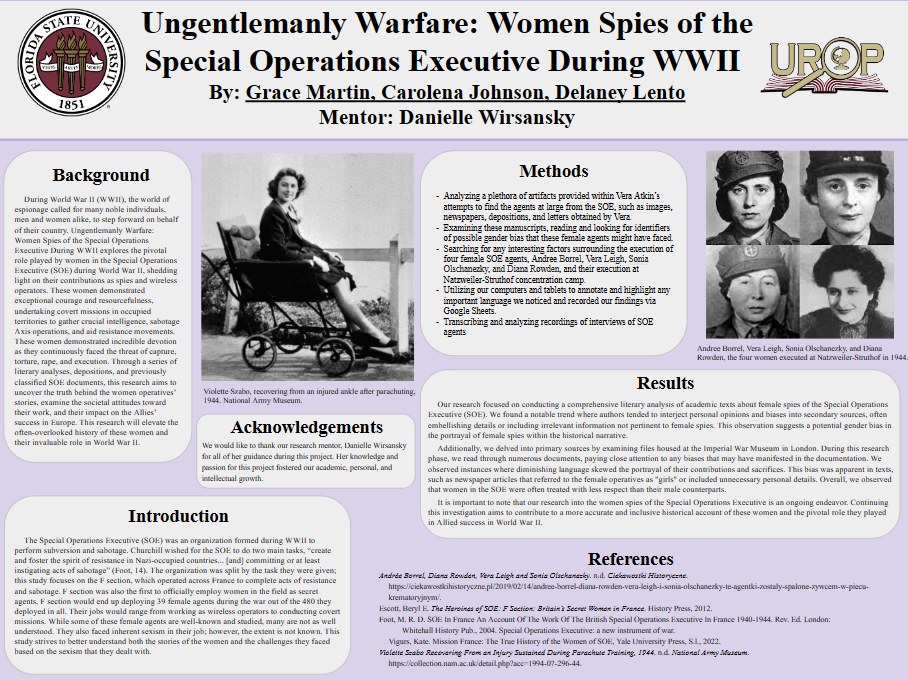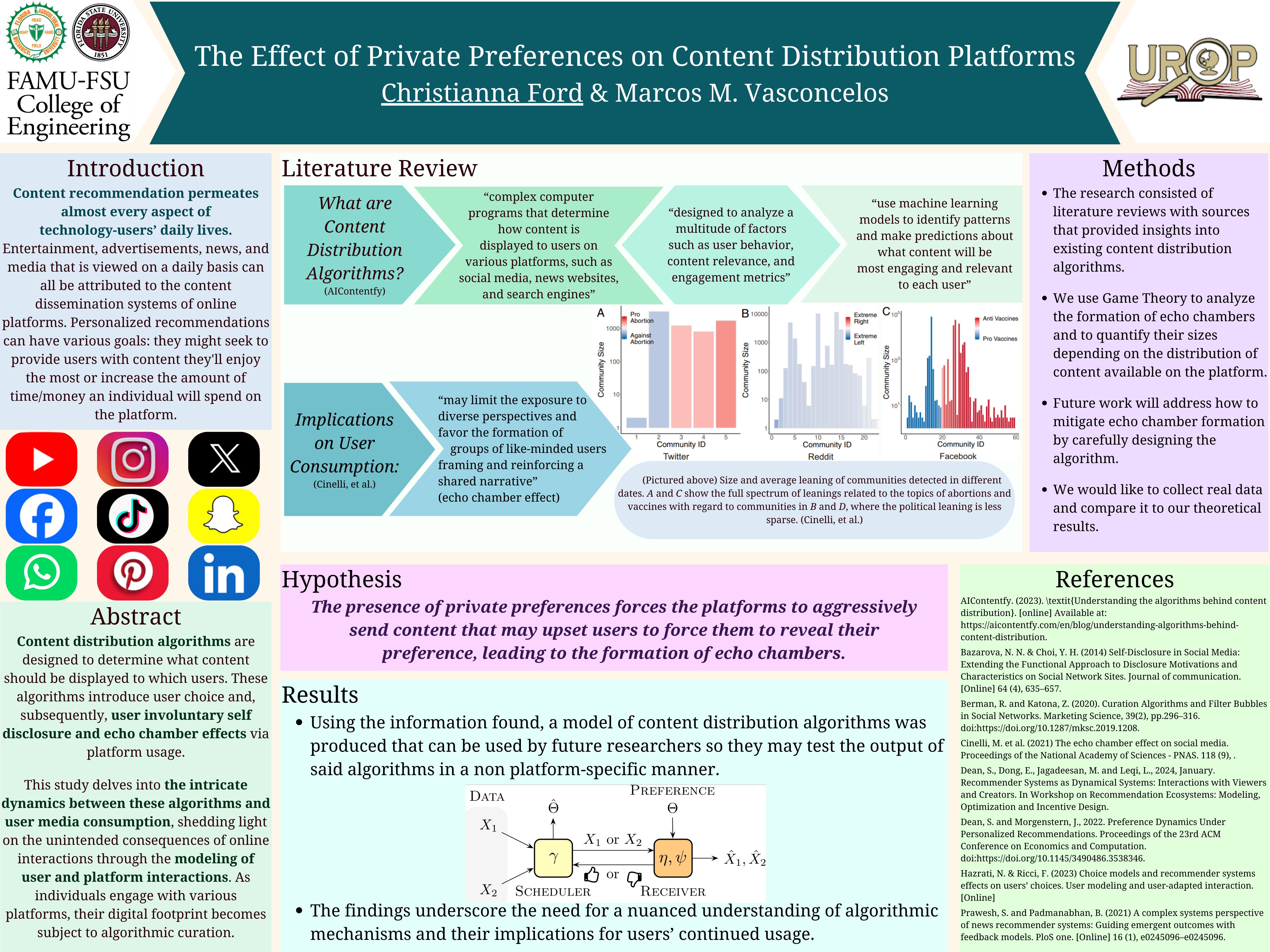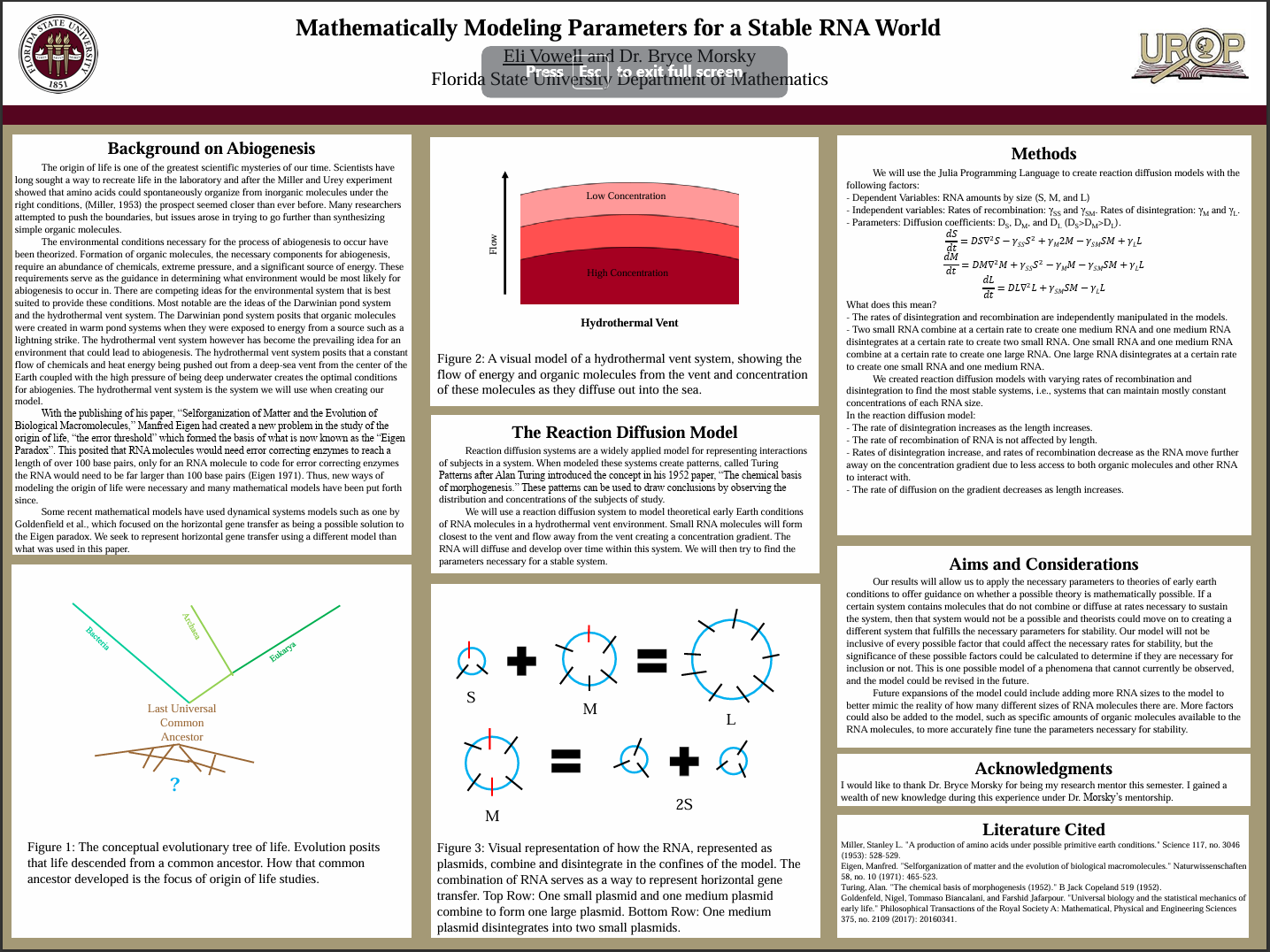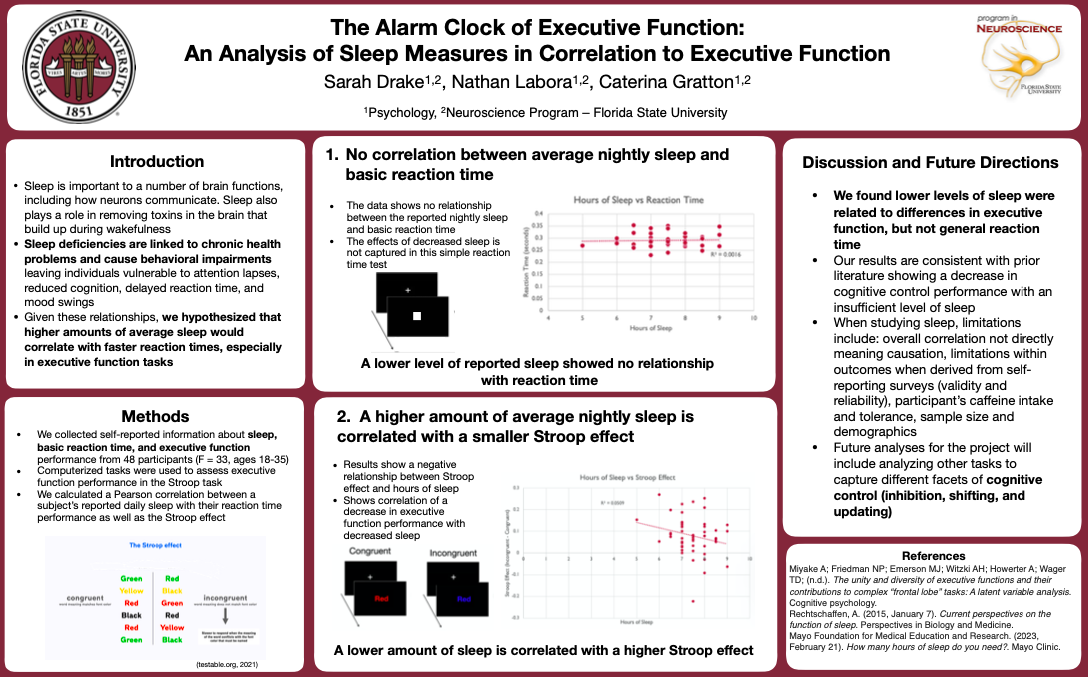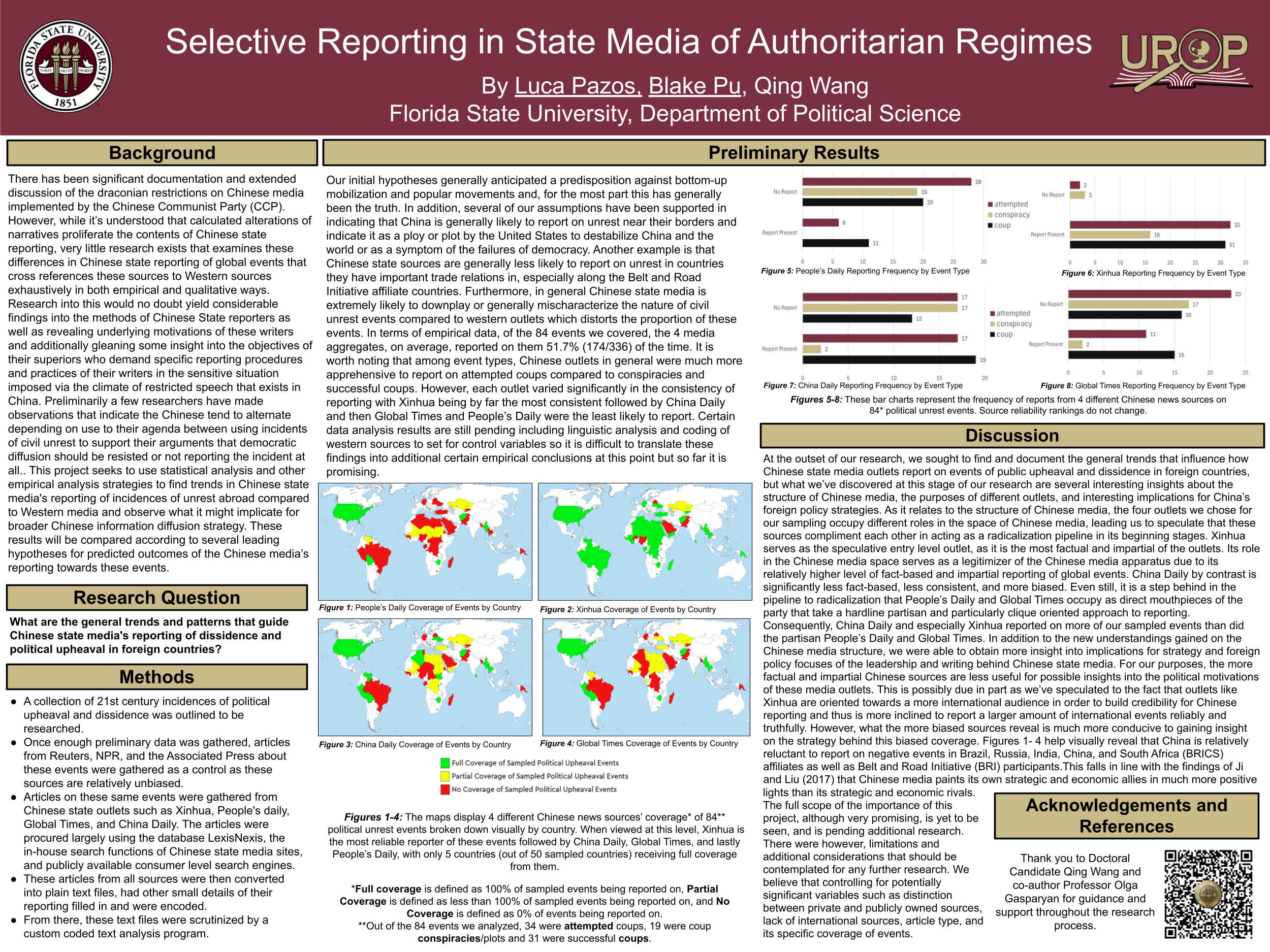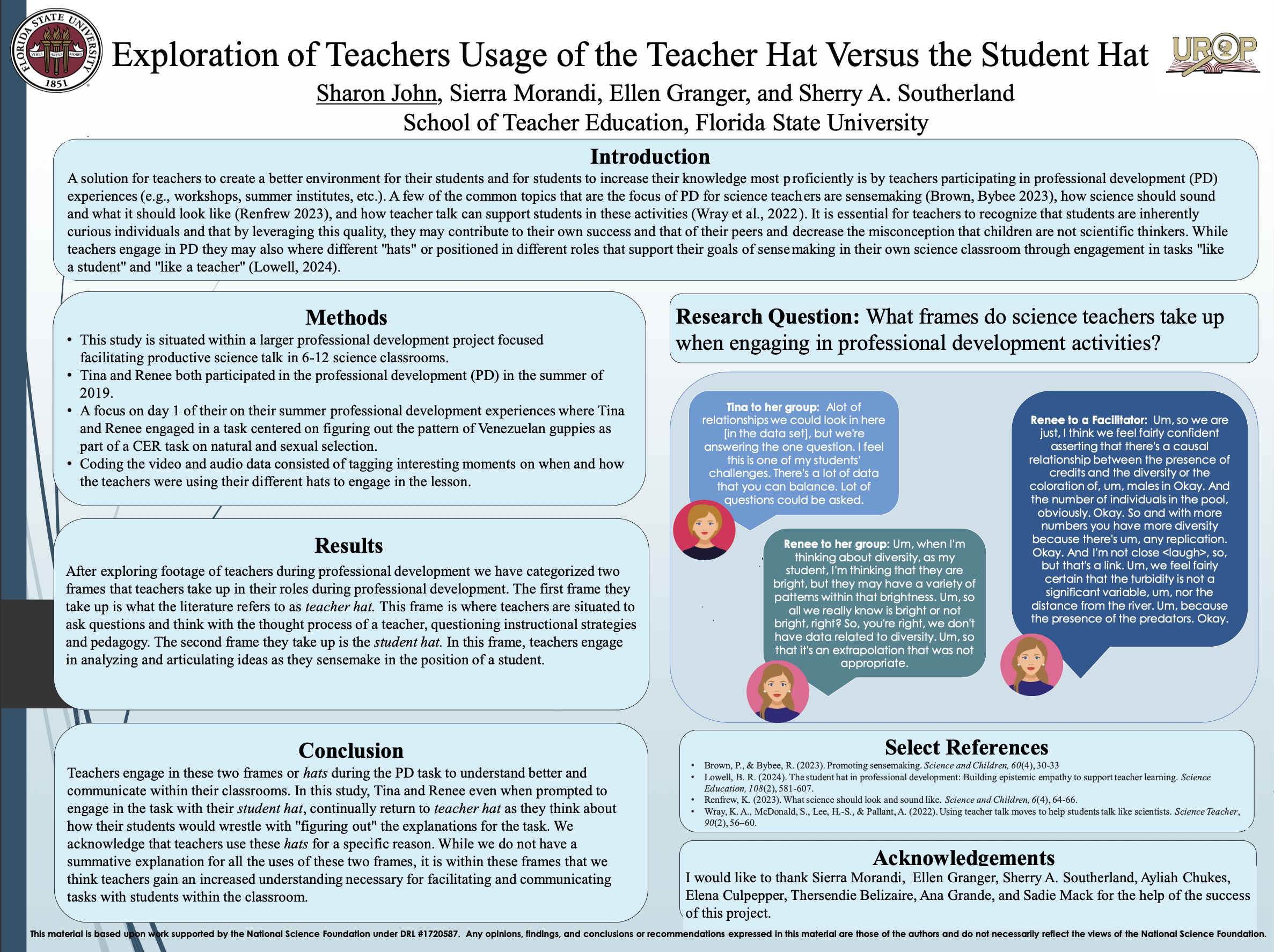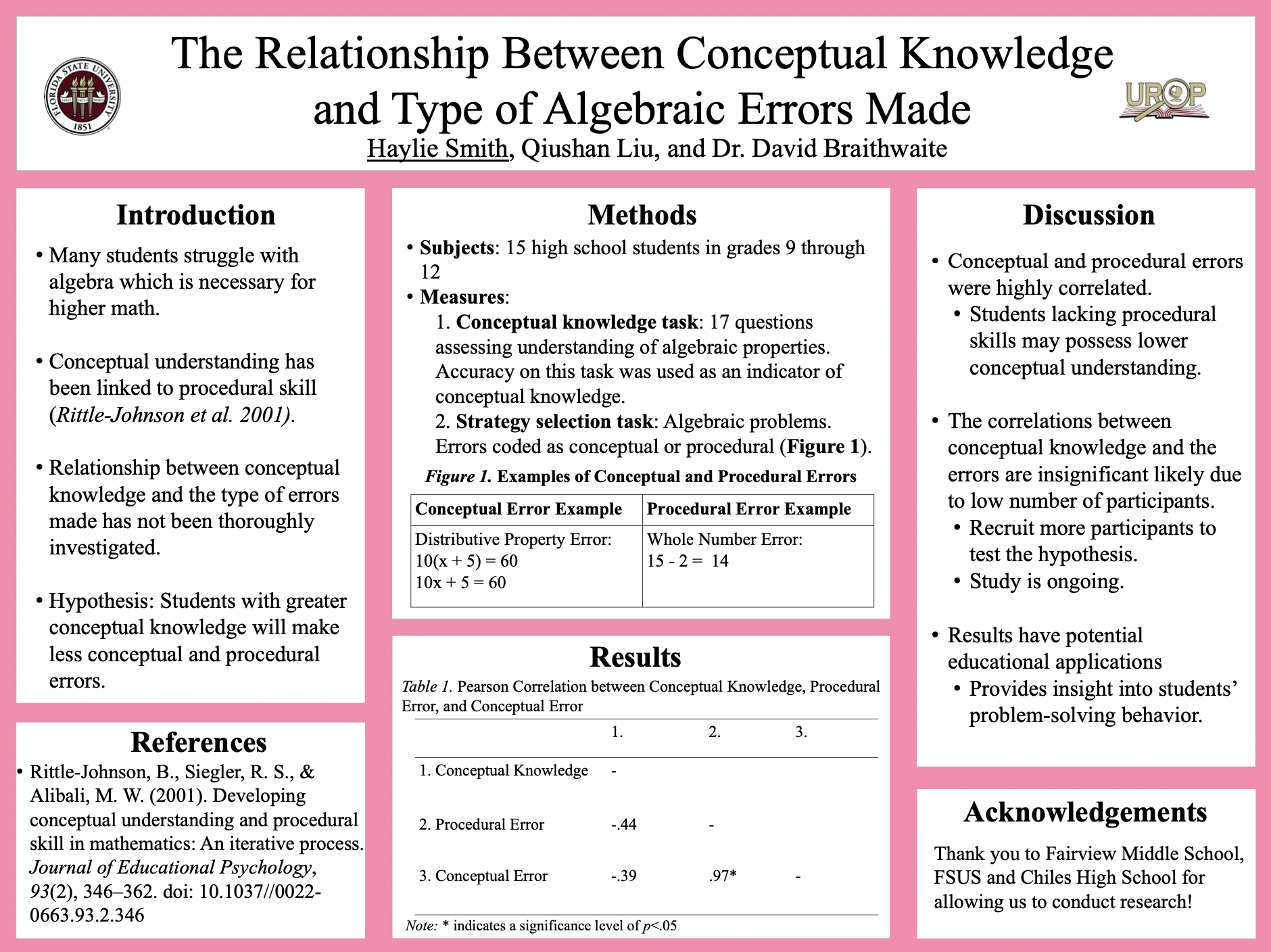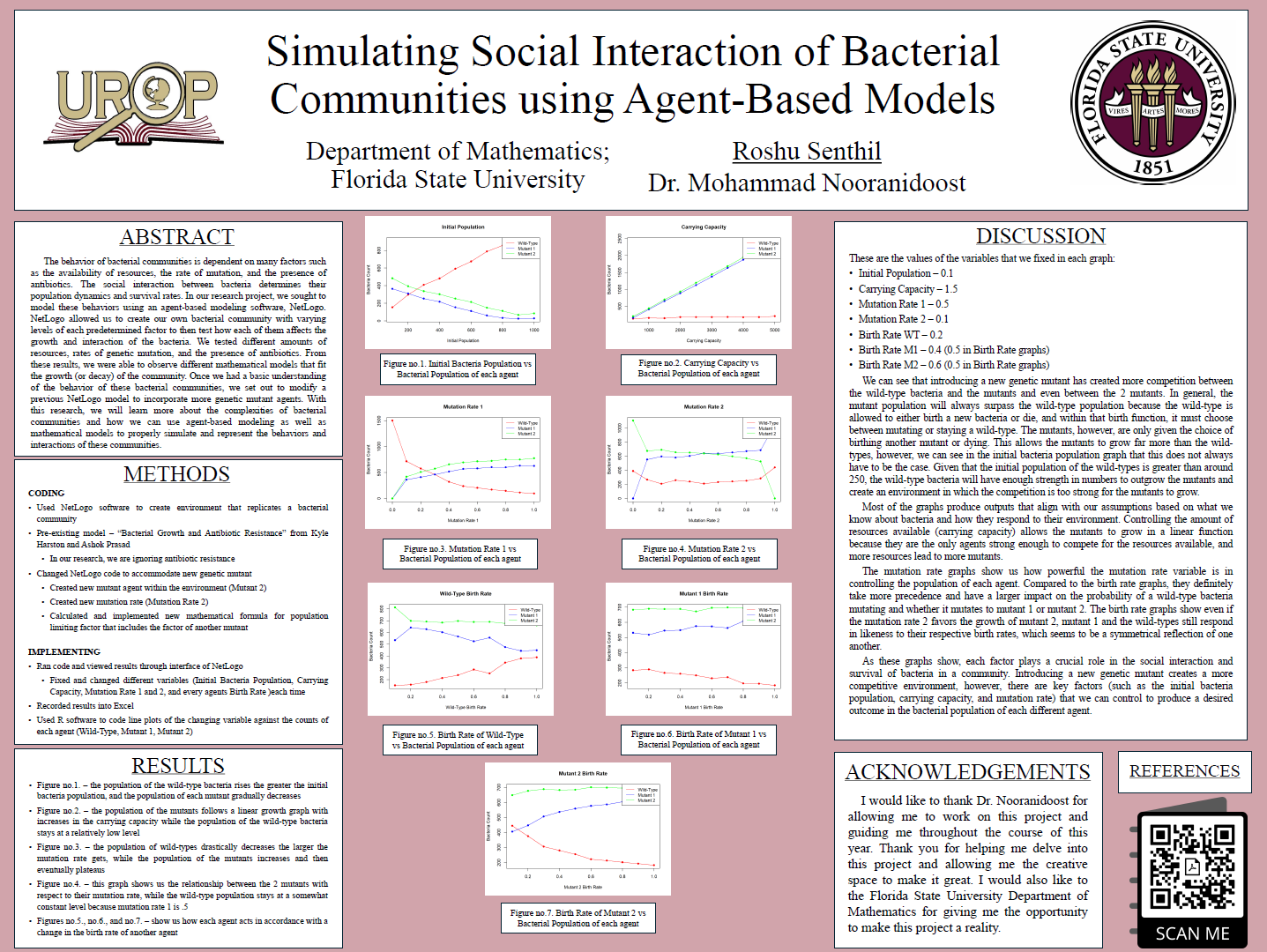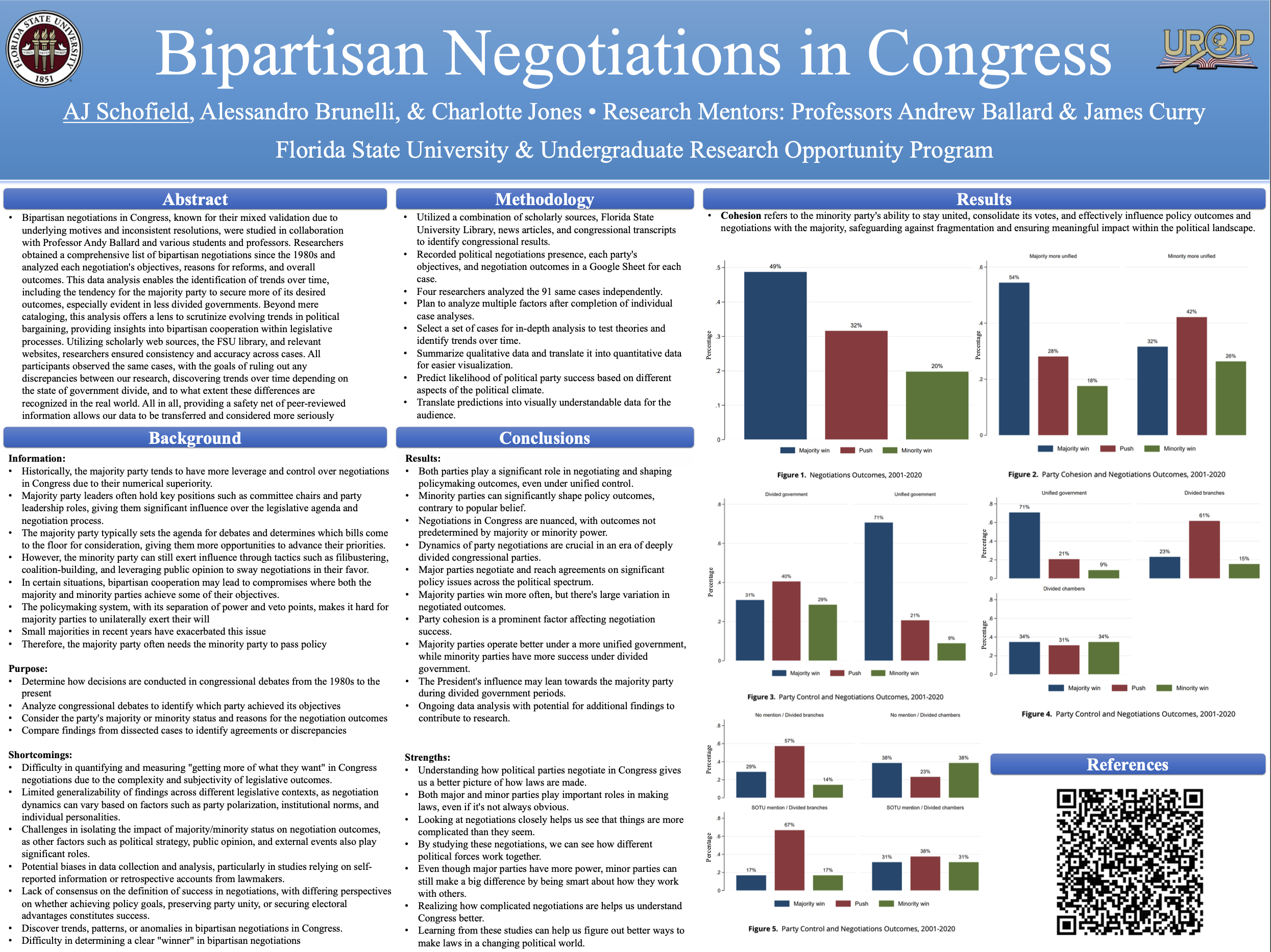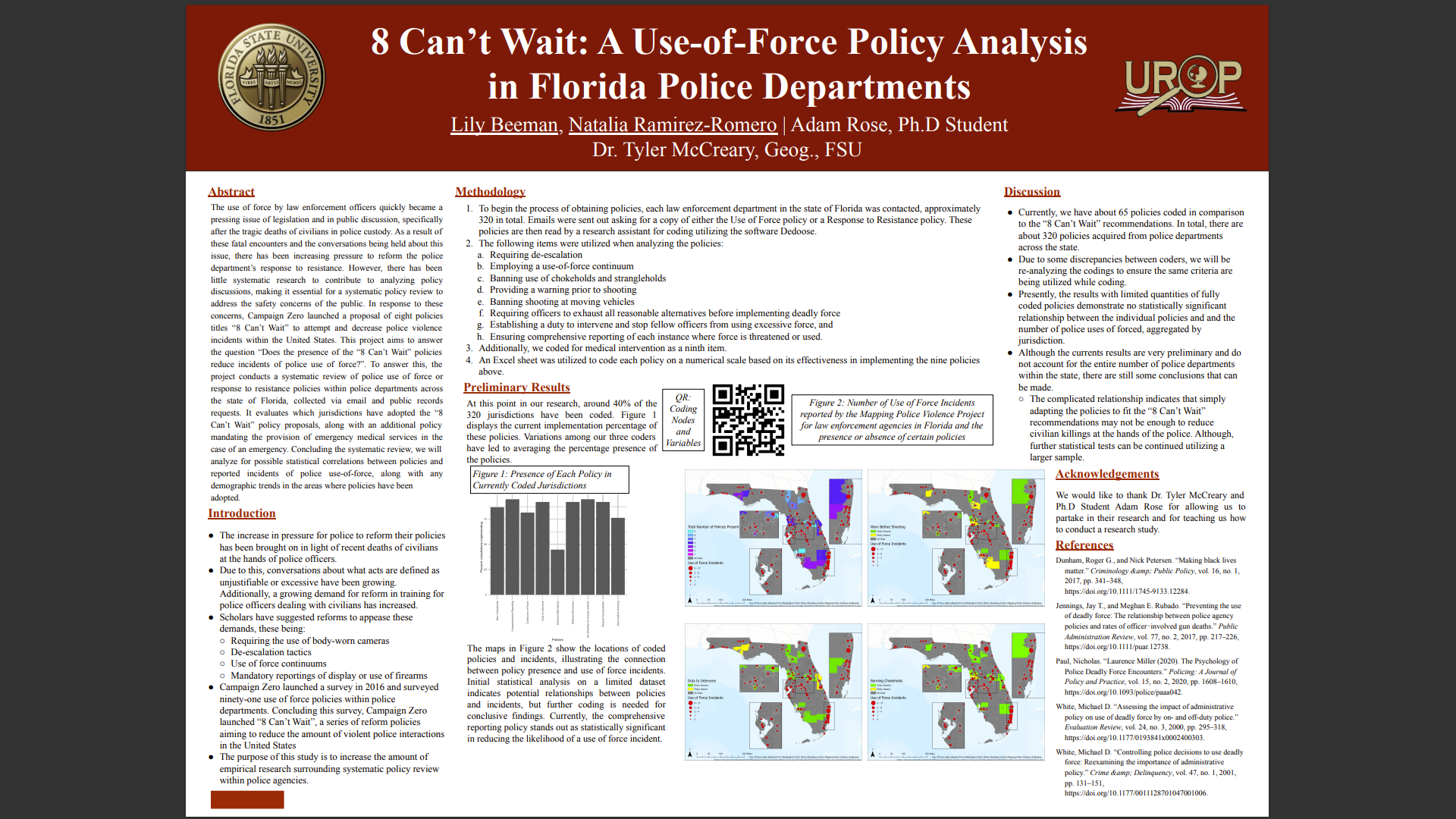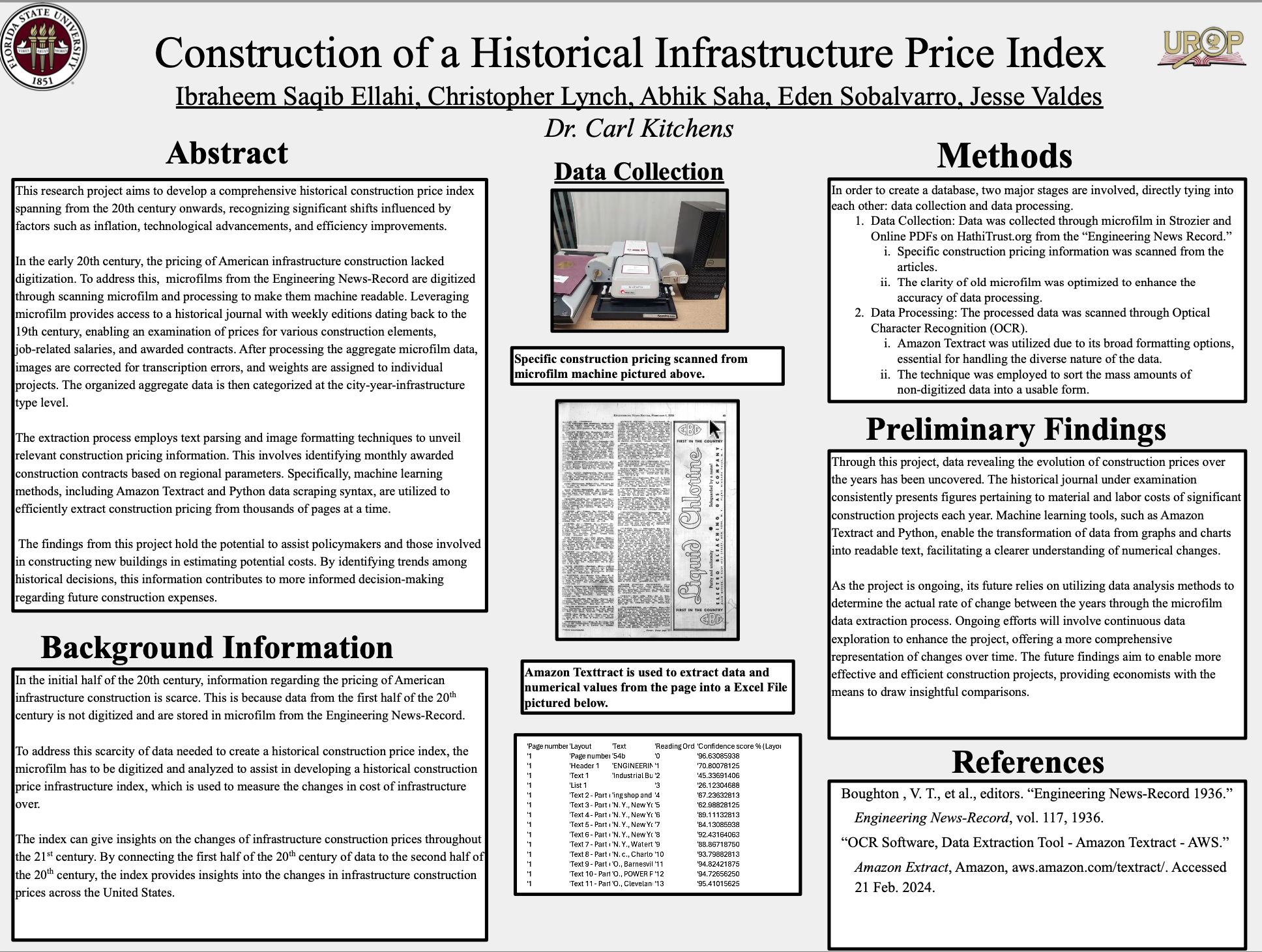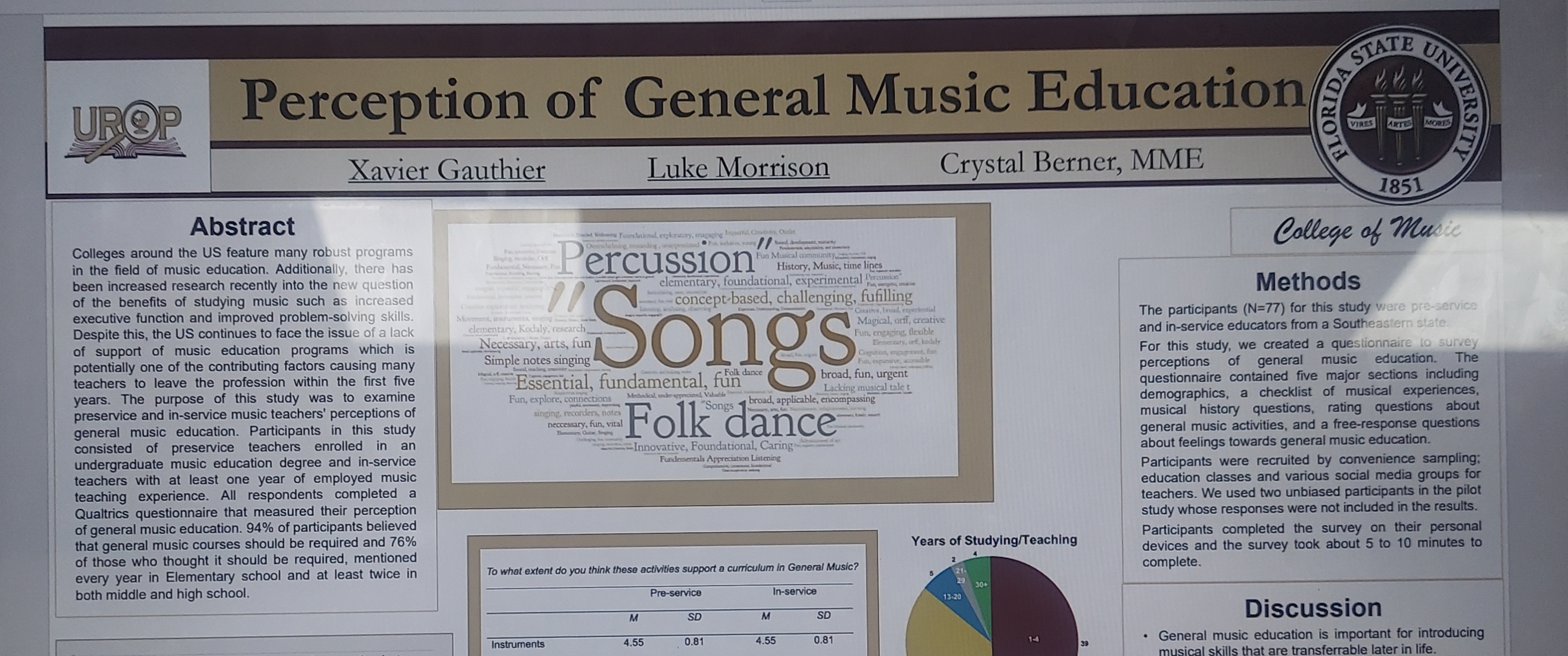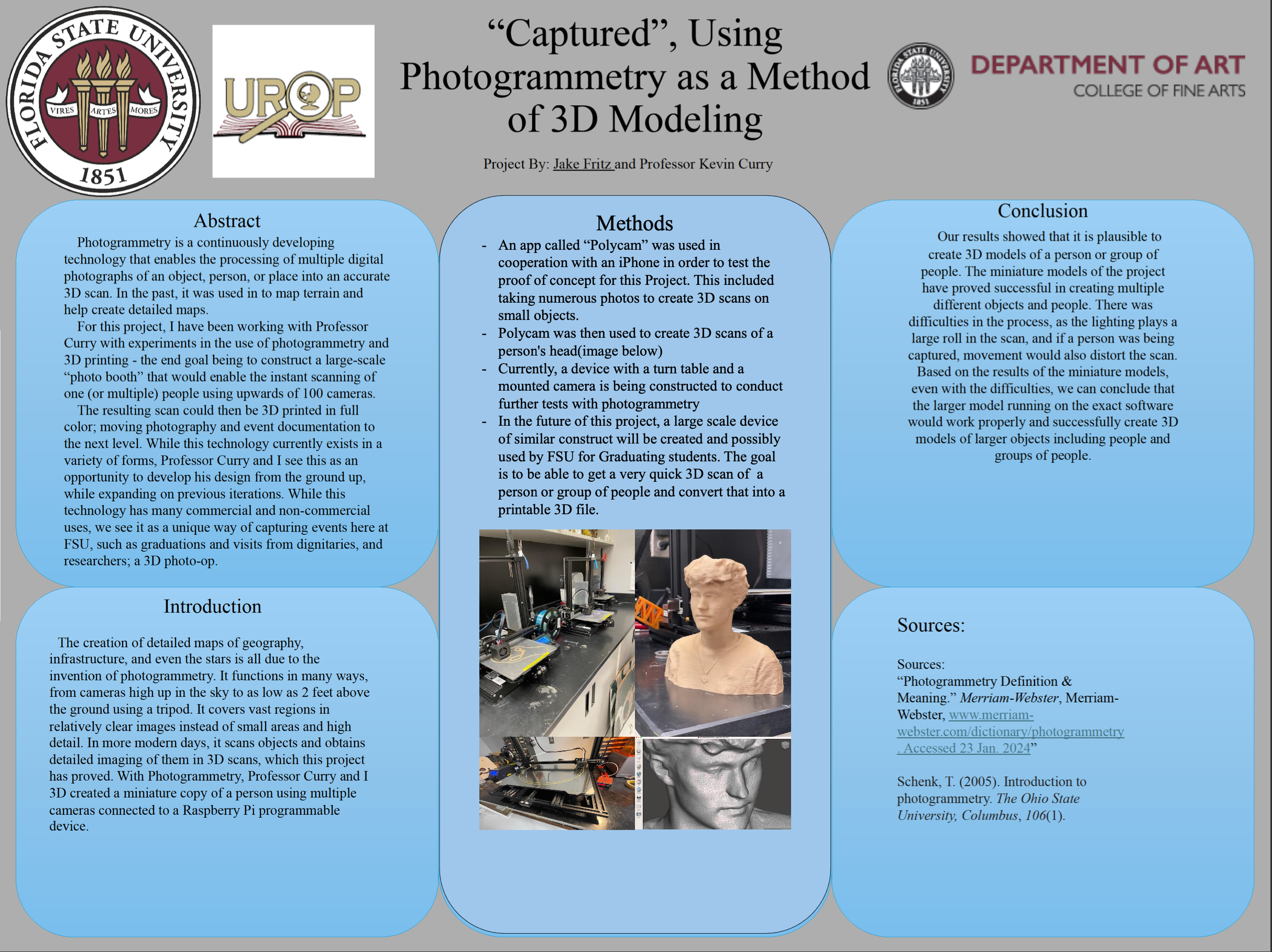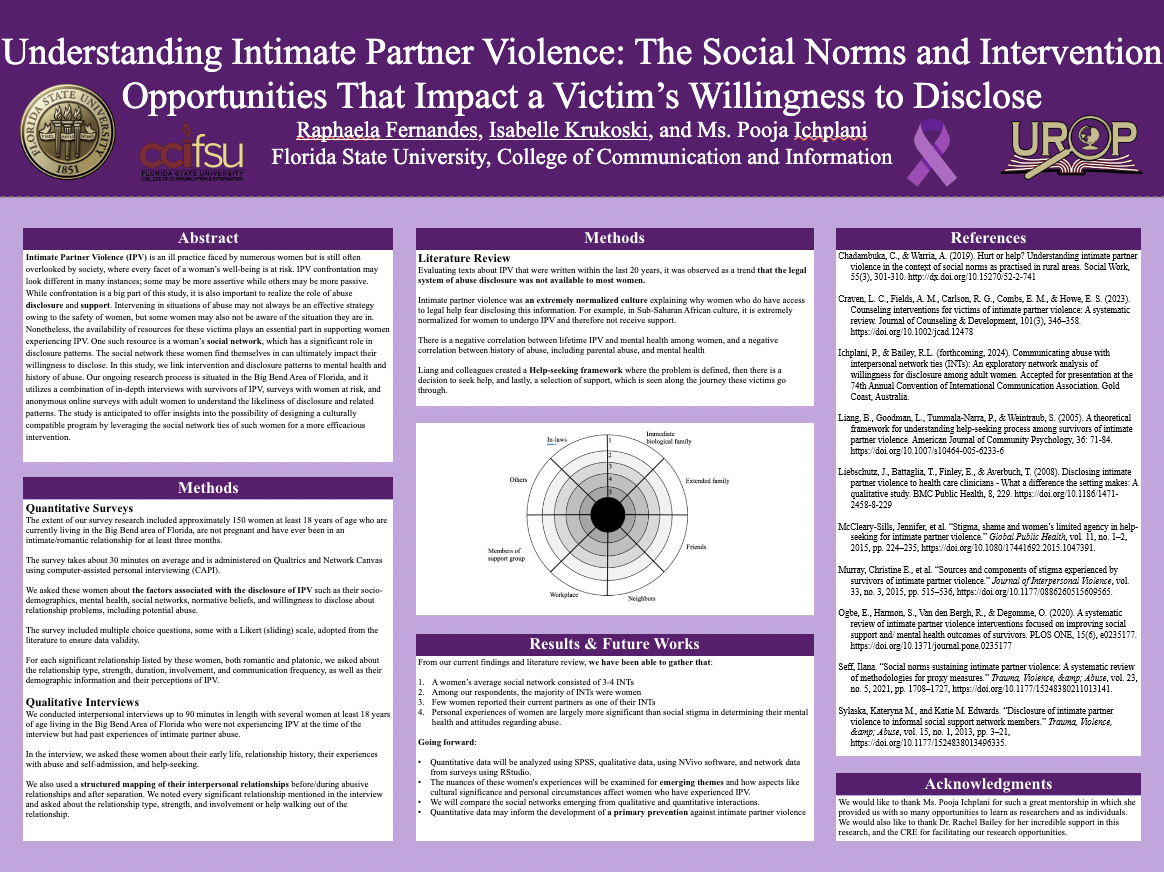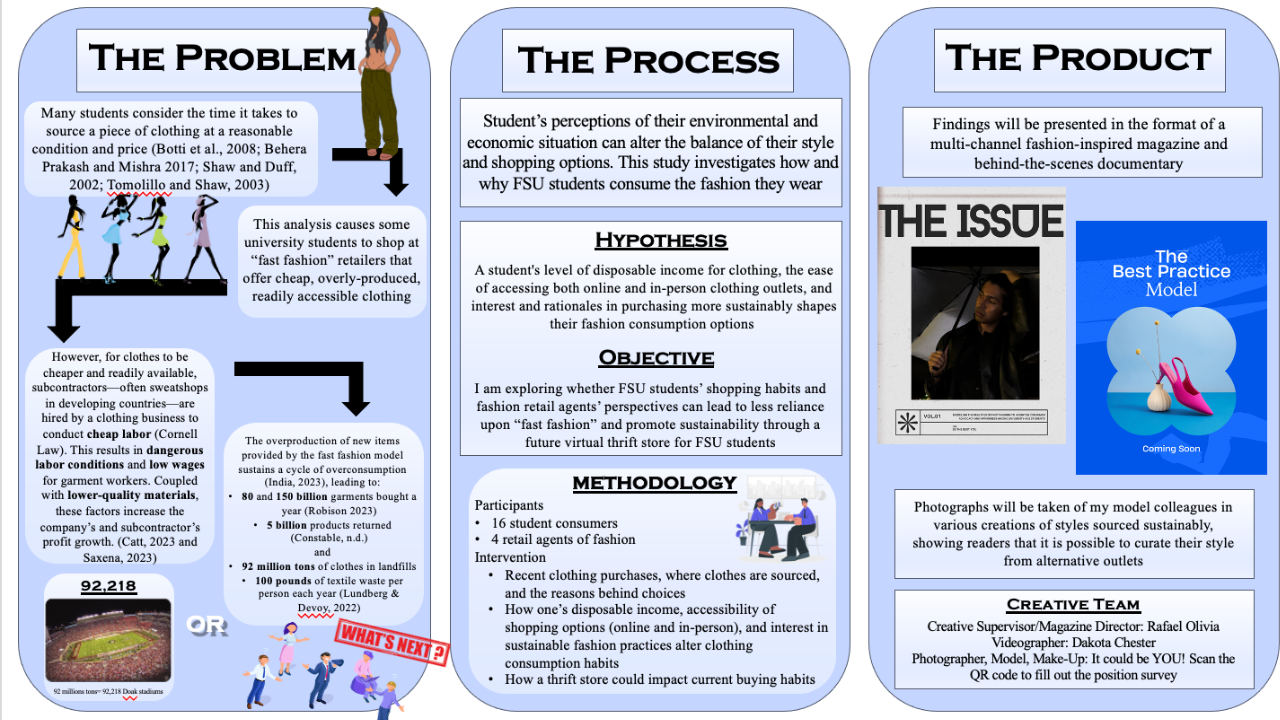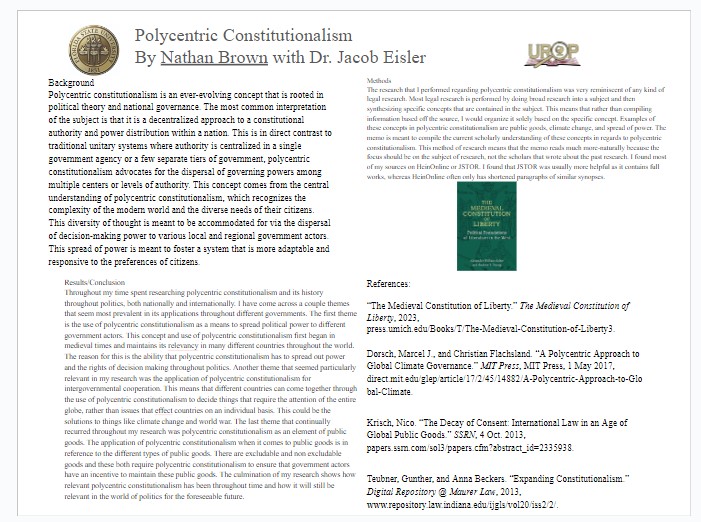Research Symposium
24th annual Undergraduate Research Symposium, April 3, 2024
Courtney Weintraub Poster Session 1: 9:30 am - 10:30 am /331
BIO
My name is Courtney, and I am a first-year student from Charlotte, NC. I am a Computational Biology major and hope to have a career in the medical field in the future. I have enjoyed being able to participate in Dr. Lemmon's lab and look forward to gaining more experience in research throughout my academic career!
Modeling Neural Circuits to Understand Incipient Speciation Part 1: Quantifying Potential for Reproductive Isolation
Authors: Courtney Weintraub, Alan LemmonStudent Major: Computational Biology
Mentor: Alan Lemmon
Mentor's Department: Scientific Computing Mentor's College: College of Arts and Sciences Co-Presenters:
Abstract
As a certain species evolves over time, their neural circuits, or the structure of how neurons are arranged by synapses for a function, also evolve. However, evolution of neural circuits may also inhibit evolution. This experiment explores the aspects of neural circuits in chorus frogs to take note of the relationship between evolution and neural circuits. Through our research, we aim to create a computational model of the frogs’ neural circuits to predict the chances of speciation. We are analyzing frogs found in the southeastern United States, and using computer programs that compute likelihood scores of breeding compatibility and success between frogs from different populations. Neural circuits have redundant parameterization, and throughout the experiment, we have seen that several distinct parameter sets can produce neural circuits that respond in the same way to a suite of calls. The next part of the experiment will explore the way the behavior changes across parameter space to find if it is consistent from one peak to another. Recognizing the correlation between neural circuits and evolution allows us to predict and analyze evolution patterns in other species, and results from this project paves a way for future endeavors in the field of evolution and neuroscience.
Keywords: neural circuits, evolution, reproductive isolation
24th annual Undergraduate Research Symposium, April 3, 2024
Ben Kelly Poster Session 1: 9:30 am - 10:30 am /408
BIO
Hi, I'm Ben Kelly, and I'm super excited to be presenting at the Symposium in April. I'm a sophomore from McLean, Virginia; studying Social Science Education. The project I'm working on focuses on seeing how school administrators view the challenges they face as leaders of school communities.
Public School Leadership in Times of Uncertainty: A Rendering of the Influence of Education Policy on Leadership Practice in Florida Schools
Authors: Ben Kelly, Dr. Daniel MoraguezStudent Major: Social Science Education
Mentor: Dr. Daniel Moraguez
Mentor's Department: Department of Educational Leadership & Policy Studies Mentor's College: FSU College of Education, Health, and Human Sciences Co-Presenters: Maria Huezo
Abstract
There have been increasing efforts in the United States to draw back Diversity, Equity, and Inclusion (DEI) programs in public education. In response, educational leadership is dealing with the consequences of attempting to create equitable environments for all students within schools while appealing to the politics of their state. Current research has looked at political atmospheres and teacher attitudes but has not identified any solutions for how educational leaders should respond. We hope to discover how educational leaders feel in response to these initiatives and how we, as educational leadership trainers, can adapt our training methods to help leaders prepare to handle politically charged school environments. For the purpose of this study, we decided to look at 2 counties in Florida (referred to as River County and Forest County). We solely focused on K-12 public schools. To discover the attitudes of educational leaders, we conducted 30-minute semi-structured interviews with 5 principals. After conducting the interviews, we developed transcripts and completed a data analysis. The results of this study indicate difficulties in educational leadership experience managing teachers and faculty in implementing culturally responsive education. We were interested to discover that in majority-minority schools, administrators experience an atypical protection from state mandates and, as a result, feel that they do not need to comply with anti-DEI legislation.
Keywords: principal, DEI, schools
24th annual Undergraduate Research Symposium, April 3, 2024
Jadyn Forman Poster Session 2: 10:45 am - 11:45 am/134
BIO
Jadyn Forman is in her second year at FSU. In addition to being an Anthropology major, she is a pre-medical student aspiring to be a surgeon one day. Outside her classes, she is an Exploratory Peer Advising Leader with FSU Advising First and Director of Academic Enrichment at Alpha Gamma Delta. She hopes to conduct more medical anthropology research in conjunction with continuing her work on "Vaccine Hesitancy Amongst the Hadza Population of Tanzania" beyond her time in UROP.
Vaccine Hesitancy Amongst the Hadza Population of Tanzania
Authors: Jadyn Forman, Dr. Eric ShattuckStudent Major: Anthropology
Mentor: Dr. Eric Shattuck
Mentor's Department: Anthropology Mentor's College: College of Arts and Science Co-Presenters: Shilpa Shiju
Abstract
Research into vaccination hesitancy can provide valuable information as to why some cultures reject vaccinations, which can then be used to increase vaccination acceptance. This study focuses on the hunter-gatherer Hadza tribe in Tanzania, who have a heavy belief in traditional medicine. This is in part due to limited access to healthcare and vaccinations because of geographical conflicts. The study will provide culturally relevant information on the tribe's views on vaccination, which cannot be gained in nationwide studies.
This study surveyed 91 participants across 6 different Hadza camps. The participants were asked various questions relating to medical information and vaccine access/information in their communities.
The majority of participants in the survey answered that they strongly believe vaccines are safe (64.8%) and effective (65.2%). There were no significant differences in these beliefs across camps. When asked if vaccines were important for children to have, 72.2% of participants strongly agreed that they were, 23.33% didn’t know, and only 1.1% strongly disagreed. This is in contrast to how 31.5% of participants strongly agreed and 29.2% strongly disagreed with the statement that vaccines are important for adults to have, though they did have a somewhat similar amount of people answering that they didn’t know, with 26.97%.
The Hadza people obtain vaccine information from multiple avenues which include medical staff, tribal leaders, and traditional healers. These avenues provide the tribe with a strong sense of security during the vacations they receive.
Keywords: Anthropology, Vaccine, Tanzania, Hadza
24th annual Undergraduate Research Symposium, April 3, 2024
Carolena Johnson Poster Session 2: 10:45 am - 11:45 am/102

BIO
Carolena is a first year student double majoring in International Affairs and Public Health. Her goal is to one day work for NGOs on an international scale in order to better the health of all. Her interest in this specific research area stems from a childhood obsession with spies and a more recent interest in the history less often told. This links with her areas of study due to her desire to focus on underrepresented communities and elevating their voices.
Ungentlemanly Warfare: Woman Spies of the Special Operations Executive During WWII
Authors: Carolena Johnson, Danielle WirsanskyStudent Major: International Affairs/Public Health
Mentor: Danielle Wirsansky
Mentor's Department: History Mentor's College: College of Arta and Sciences Co-Presenters:
Abstract
During World War II (WWII), the world of espionage called for many noble individuals, men and women alike, to step forward on behalf of their country. Ungentlemanly Warfare: Women Spies of the Special Operations Executive During WWII explores the pivotal role played by women in the Special Operations Executive (SOE) during World War II, shedding light on their contributions as spies and wireless operators. These women demonstrated exceptional courage and resourcefulness, undertaking covert missions in occupied territories to gather crucial intelligence, sabotage Axis operations, and aid resistance movements. These women demonstrated incredible devotion as they continuously faced the threat of capture, torture, rape, and execution. Through a series of literary analyses, depositions, and previously classified SOE documents, this research aims to uncover the truth behind the women operatives’ stories, examine the societal attitudes toward their work, and their impact on the Allies’ success in Europe. This research will elevate the often-overlooked history of these women and their invaluable role in World War II.
Keywords: WWII Espionage Women
24th annual Undergraduate Research Symposium, April 3, 2024
Christianna Ford Poster Session 3: 1:30 pm - 2:30 pm /20
BIO
My name is Christianna Ford, and I am a first year Presidential Scholar pursuing a dual degree in Public Relations and Marketing with a Minor in Spanish. While studying, I am glad to have opportunities such as this one to get involved with research, and once I complete my degree program, I plan to get a Master's and potentially a Ph.D. in Communications in order to further advance my knowledge of consumer behaviors. I hope to work in a corporate field one day with a focus on client and consumer relations.
The Effect of Private Preferences on Content Distribution Platforms
Authors: Christianna Ford, Marcos VasconcelosStudent Major: Public Relations and Marketing
Mentor: Marcos Vasconcelos
Mentor's Department: Electrical and Computational Engineering Mentor's College: FAMU-FSU College of Engineering Co-Presenters:
Abstract
Content distribution algorithms are designed to determine what content should be displayed to which users. These algorithms introduce user choice and, subsequently, user involuntary self disclosure and echo chamber effects via platform usage. This study delves into the intricate dynamics between these algorithms and user media consumption, shedding light on the unintended consequences of online interactions through the modeling of user and platform interactions. As individuals engage with various platforms, their digital footprint becomes subject to algorithmic curation.
Keywords: social media, algorithm, technology, content, recommender systems
24th annual Undergraduate Research Symposium, April 3, 2024
Kashish Pandeya Poster Session 5: 4:00 pm - 5:00 pm/245
BIO
Hello! I am a second-year, pre-medical, IMS major from Tallahassee. I enjoy Jane Austen novels, playing musical instruments, and tennis. My research, at Dr. Gunjan's lab, is testing various FDA-approved drugs on keloid cell proliferation. I am passionate about cell culture research and determined to test therapeutics that can decrease keloid growth. For this reason, I intend to continue keloid research at Dr. Gunjan's lab in the College of Medicine: Biomedical Sciences Department.
Repurposing FDA-approved WNT Inhibiting Drugs for Treating Keloids
Authors: Kashish Pandeya, Dr. Akash GunjanStudent Major: Interdisciplinary Medical Sciences: Pre-Clinical Professions
Mentor: Dr. Akash Gunjan
Mentor's Department: Biomedical Sciences Mentor's College: College of Medicine Co-Presenters:
Abstract
Keloids are fibroproliferative skin lesions that occur primarily in people with dark skin due to an aberrant wound-healing process. Keloids cause deep, unreachable itches, and frequent pain, and are a cause of significant social, emotional, and physical distress, leading to a poor quality of life. They do not resolve spontaneously and need to be surgically removed. However, they have a recurrence rate of 100% following surgical removal alone. Hence, better therapeutics to treat and prevent keloid recurrence are needed.
The Wnt signaling pathway has been connected to fibroproliferation in keloids. Wnt signaling is often overactive in keloid tissue. Therapeutic inhibition of this pathway is relatively novel since Wnt is an essential pathway that promotes cell proliferation and is required for maintaining normal function in tissues and organs. Hence, we hypothesize that Wnt pathway inhibition may decrease the proliferative nature of keloid cells, especially if done locally within or on the diseased tissue. Inhibition of the cyclooxygenase-2 (COX-2) enzyme destabilizes the β‑catenin protein, an integral part of the canonical Wnt pathway. COX-2 inhibitors are well studied because of their anti-inflammatory effects and are commonly used as analgesics for pain relief. Effects of inhibiting the Wnt pathway were measured by testing the survival of keloid dermal fibroblast cells in vitro following treatments with different FDA-approved COX-2 inhibitors that also attenuate Wnt signaling. Varying concentrations of the drugs and combinations were used in an in vitro cell viability assay to determine the best combinations for effectively eliminating keloid cells.
Keywords: WNT, Inhibitors, Keloid, Cell
24th annual Undergraduate Research Symposium, April 3, 2024
Elijah Vowell Poster Session 1: 9:30 am - 10:30 am /277
BIO
Eli Vowell is an undergraduate biological sciences major at Florida State University. He is from Tallahassee, Florida. His research interests include evolutionary history, microbial development, and the origin of life. In the future he plans on attending graduate school and eventually becoming a research professor.
Mathematically Modeling Parameters for a Stable RNA World
Authors: Elijah Vowell, Bryce MorskyStudent Major: Biological Sciences
Mentor: Bryce Morsky
Mentor's Department: Department of Mathematics Mentor's College: Florida State University Co-Presenters:
Abstract
The origin of life is one of the greatest mysteries in the world of science. Understanding how molecules came to achieve a self-sustaining state has many layers. Many different parts of RNA synthesis will need to be understood to create a comprehensive model of abiogenesis. We will use a reaction diffusion model to simulate the rates of combination and rates of disintegration as a function of RNA length. Using this model, we can track the survivability of RNA stands at different rates of combination and disintegration to find the necessary parameters for a stable RNA world. We seek to build on previous literature and add to previous models to create a more cohesive model for the early evolution of life. We hope that our model will aid in furthering the understanding of abiogenesis and allow for new insight into the mathematics behind the theory.
Keywords: Origin, Life, RNA-World, Reaction-Diffusion
24th annual Undergraduate Research Symposium, April 3, 2024
Sarah Ann Katherine Drake Poster Session 1: 9:30 am - 10:30 am /87

BIO
My name is Sarah Drake and I am currently a senior at Florida State University. I am studying Psychology + Chemistry and have a passion for Neuroscience. I was born and raised in Tallahassee, Florida and from a young age knew I was interested in studying Science and Psychology at Florida State. I plan on going to graduate school and earning my PhD in either Psychology or Neuroscience. I hope to study the brain’s sleep interactions & functions in children with sleep disorders, such as Insomnia.
The Alarm Clock of Executive Function: An Analysis of Sleep Measures in Correlation to Executive Function
Authors: Sarah Ann Katherine Drake, Caterina GrattonStudent Major: Psychology, Chemistry
Mentor: Caterina Gratton
Mentor's Department: Psychology Mentor's College: College of Arts and Sciences Co-Presenters:
Abstract
Sleep is important to several brain functions, including how neurons communicate and removing toxins in your brain that build up while you are awake. Sleep deficiency is linked to chronic health problems and causes behavioral impairments leaving individuals vulnerable to attention lapses, reduced cognition, delayed reaction time, and mood swings. Given these relationships, we hypothesized that higher amounts of average sleep would correlate with faster reaction times, especially in executive function tasks. We collected information about sleep (from self-report surveys), basic reaction time, and executive function performance from 48 participants (F = #33 of females, ages 18-35). Computerized tasks were used to assess executive function performance for factors of inhibition (e.g., anti-saccade, stop-signal, and Stroop tasks), updating (e.g., keep track, tone monitoring, and letter memory tasks) and shifting (e.g., plus-minus, number-letter, and local-global tasks). We plan to relate each person’s sleep level with their average basic reaction time, as well as reaction times associated with inhibition, updating, and shifting tasks. Initial results show a relationship between a slower basic reaction time with a lower average nightly sleep time. A negative correlation between sleep amount and basic reaction time shows a reduction in overall behavioral performance. We also plan to look at the correlation between executive function dependent measure reaction times with average sleep across subjects to more specifically address the effect of sleep on executive function behavior.
Keywords: Sleep, Executive Functioning, Neuroscience, Cognition
24th annual Undergraduate Research Symposium, April 3, 2024
Blake Pu Poster Session 1: 9:30 am - 10:30 am /174
BIO
My name is Blake Pu and I'm a first-year from Orange Park, Florida studying at Florida State University. While I'm studying Mechanical Engineering I've long had a passion for history and social sciences. I hope to use my UROP experience to pursue further research in these fields. After completing my undergrad here at Florida State I would like to go to law school. I am involved with a number of organizations on campus including the FSU Cheerleading Team, Presidential Scholars, Honors Legal Scholars, Student Government Association, the Asian Student Union, and more! As the descendant of Chinese immigrants this project was particularly interesting to me as a confluence of both my passions and my heritage. I hope that I can leverage this experience to impact the research community and understandings of my research topic to be understood in terms of empirical data and structural analysis. In addition I would like to use this experience as the starting point for a longer and more illustrious career of research involvement particularly as it pertains to my interests of social sciences, engineering, history, business and law.
Selective Reporting in State Media of Authoritarian Regimes
Authors: Blake Pu, Qing WangStudent Major: Mechanical Engineering
Mentor: Qing Wang
Mentor's Department: Political Science Mentor's College: College of Social Sciences and Public Policy Co-Presenters: Luca Pazos
Abstract
Historical waves of political upheaval, particularly in the last 40 years have demonstrated the power and pervasiveness of the media’s role in contributing to political mobilization. In response, autocratic governments have employed measures to deter citizens from emulating successful collective action abroad. China offers a pertinent case study for understanding restricted access to independent media because of the state apparatuses that exist to wield strategic control over the media by the government. Past research has indicated possible evidence of bias towards more positive reporting of nations with a strong economic relationship with China. However, there is still a significant gap in research regarding patterns of reporting in this massive media infrastructure. This project investigates patterns of reporting and censorship in Chinese state media with an emphasis on coverage of political unrest abroad. Herein we present research that compiles articles from several Chinese state media outlets on international events such as coups, protests, unrest, and civil conflict to cross-reference them with western outlets reporting on the same events in the same time frame in order to observe trends, differences, and discrepancies between them. The methods used consist of linguistic statistical analysis and qualitative analysis. The current results indicate that among many other interesting developments, Chinese state outlets are much less likely to report on political upheaval, and when they do, they are far more likely to attribute them to outside intervention (especially if they suspect US involvement), and they often report on these events in a negative light.
Keywords: China State Media
24th annual Undergraduate Research Symposium, April 3, 2024
Sharon John Poster Session 3: 1:30 pm - 2:30 pm /415

BIO
Sharon John is a first-year student at Florida State University, pursuing a Bachelor’s degree in Biological Sciences degree with a focus on pre-med. After college, she wants to work as a pediatrician. She has loved researching in the field of education and would love to continue exploring research opportunities in other fields such as psychology. Sharon has been volunteering at hospitals for the past two years and has enjoyed taking on various roles within the hospital as she engages as a volunteer and exposes herself to the wide array of possibilities within the medical field. One of her goals is to go to India and help out on the medical team of a nonprofit organization called Asha. Doing so allows Sharon to engage with children as well as practice medical support.
Exploration of Teachers Usage of the Teacher Hat Versus the Student Hat
Authors: Sharon John, Sierra MorandiStudent Major: Biological Sciences
Mentor: Sierra Morandi
Mentor's Department: School of Teacher Education Mentor's College: College of Education, Health and Human Sciences Co-Presenters:
Abstract
The intention of this project was to support teachers in facilitating productive talk around science ideas in secondary science classrooms through professional development. These spaces of talk are driven by the students’ ideas and experiences. The research team watched lessons during one activity in the professional development experience where teachers were engaging in a lesson supportive of their “student hat.” The focus of this study is two high school science teachers during this “student hat” time. We found that teachers engaged in both their “student” and “teacher hat” while engaging in the lesson. Our findings help us support teachers in facilitating experiences for students and supporting teachers in their pedagogical development while wearing both hats. This work has implications for PD helping facilitators and researchers better understand how teachers can engage in professional development.
Keywords: Teacher education, professional development, science education
24th annual Undergraduate Research Symposium, April 3, 2024
Haylie Smith Poster Session 2: 10:45 am - 11:45 am/314
BIO
Hi! My name is Haylie Smith. I’m a first year Behavioral Neuroscience major at Florida State University, and I’m from Sarasota, Florida. The research I am assisting with focuses on aspects of algebraic problem solving, which is essential for students’ success in algebra and higher math. I plan to make the most of my time here at FSU so that I can grow as a student, researcher, and person by continuing my involvement in psychological research. My goal is to go to medical school and become a physician! In my free time, I love playing with my dog, drawing, and spending time with friends.
The Relationship Between Conceptual Knowledge and Type of Algebraic Errors Made
Authors: Haylie Smith, Qiushan LiuStudent Major: Behavioral Neuroscience
Mentor: Qiushan Liu
Mentor's Department: Department of Psychology Mentor's College: College of Arts and Sciences Co-Presenters:
Abstract
Understanding and being able to solve algebraic problems is essential for high school students who want to progress to advanced math and further education. Conceptual knowledge is the understanding of algebraic principles, and procedural knowledge is the knowledge of the procedure, which is the steps to solve the problem. Past studies like Rittle-Johnson et al. 2001 have found conceptual and procedural knowledge to be positively related. However, past research has not thoroughly explored if higher conceptual knowledge indicates that students are less likely to make mistakes reflecting conceptual understanding (e.g., solving 2(x+2) as 2x+2 is an error reflecting a conceptual misunderstanding of the distributive property). Participants completed a packet testing their conceptual knowledge and problem-solving ability. The errors students made in the problem-solving section were coded to be conceptual or procedural. The number of conceptual and procedural errors students made was correlated with their score on the conceptual knowledge task. There was a high correlation between conceptual and procedural errors, suggesting participants typically commit both types of errors at the same time (r(13)=.97, p=0.000). We observed an insignificant negative correlation between conceptual knowledge and procedural errors (r(13)=-.44, p=0.100) and an insignificant negative correlation between conceptual knowledge and conceptual errors (r(13)=-.39, p=0.145), likely due to the low number of participants. Still, the findings suggest when students have better conceptual understanding of algebraic concepts, they may make less conceptual and procedural errors. With improved conceptual understanding, students could perform better overall in math, setting them up for future success.
Keywords: conceptual knowledge, algebraic errors
24th annual Undergraduate Research Symposium, April 3, 2024
Roshu Senthil Poster Session 4: 2:45 pm - 3:45 pm /100
BIO
Hi! My name is Roshu Senthil, and I am currently a second-year Statistics major here at FSU. Originally from Papillion, Nebraska, I now reside in Tampa, Florida, having moved here two years ago. Currently, I am actively involved in the FSU Honors Program, the Florida Beta Chapter of Pi Mu Epsilon, and I work part-time as a Data Entry Specialist for a traffic counts company.
In the future, I aspire to work as a Data Analyst for AWS, as the field of data science has always fascinated me. I enjoy learning and working with various programming languages to synthesize and analyze data. This research project particularly caught my interest due to its intersection between biology, mathematical modeling, and programming. I hope to further enhance the skills gained through this research project in my career, and I eagerly anticipate future developments in this area!
Simulating Social Interaction of Bacterial Communities using Agent-Based Models
Authors: Roshu Senthil, Dr. Mohammad NooranidoostStudent Major: Statistics
Mentor: Dr. Mohammad Nooranidoost
Mentor's Department: Department of Mathematics Mentor's College: College of Arts and Sciences Co-Presenters:
Abstract
The behavior of bacterial communities is dependent on many factors such as the availability of resources, the rate of mutation, and the presence of antibiotics. The social interaction between bacteria determines their population dynamics and survival rates. In our research project, we sought to model these behaviors using an agent-based modeling software, NetLogo. NetLogo allowed us to create our own bacterial community with varying levels of each predetermined factor to then test how each of them affects the growth and interaction of the bacteria. We tested different amounts of resources, rates of genetic mutation, and the presence of antibiotics. From these results, we were able to observe different mathematical models that fit the growth (or decay) of the community. Once we had a basic understanding of the behavior of these bacterial communities, we set out to modify a previous NetLogo model to incorporate more genetic mutant agents. With this research, we will learn more about the complexities of bacterial communities and how we can use agent-based modeling as well as mathematical models to properly simulate and represent the behaviors and interactions of these communities.
Keywords: Bacterial Communities, Mathematical Modeling, Agent Based Modeling
24th annual Undergraduate Research Symposium, April 3, 2024
AJ Schofield Poster Session 5: 4:00 pm - 5:00 pm/179
BIO
AJ Schofield is a freshman at Florida State University. He is originally from West Palm Beach, Florida. AJ is majoring in finance on the pre-law track. In terms of career paths, he is narrowing them down to either in the field of finance or law. For his interests, he loves the piano, as he's been training classically since the age of 5. Additionally, he loves dogs, as he has trained them on behalf of animal shelters and has owned several his entire life.
Bipartisan Negotiations in Congress
Authors: AJ Schofield , Andrew BallardStudent Major: Finance
Mentor: Andrew Ballard
Mentor's Department: Political Science Mentor's College: College of Social Sciences and Public Policy Co-Presenters:
Abstract
Bipartisan negotiations in Congress have received mixed validation due to their nature of having underlying motives and inconsistent resolutions. In collaboration with Professor Andy Ballard, and various other students and professors, student researchers have received a plentiful list of bipartisan negotiations since the 1980s. For each negotiation, students researched which party wanted which reforms, the reasons for this requested change, and which party received more of what they wanted overall. Utilizing this data allows us to analyze trends over time and predict future outcomes with improved accuracy. These conclusions range from identifying that the majority party usually gets more of what they want, or that under a more divided government, the party majority doesn’t have a remarkable effect. The analysis of these negotiations goes beyond merely cataloging events; it provides a lens through which researchers can scrutinize evolving trends over time. By identifying patterns in the give-and-take of political bargaining, researchers seek to derive conclusions that offer insights into the broader landscape of bipartisan cooperation within legislative processes. The students used a combination of scholarly web sources, the FSU library, and various websites containing information on previous Congress summaries and transcripts. All participants observed the same cases, with the goals of ruling out any discrepancies between our research, discovering trends over time depending on the state of government divide, and to what extent these differences are recognized in the real world. Ultimately, providing a safety net of peer-reviewed information allows our data to be transferred and considered more seriously.
Keywords: Congress, Negotiations, Bipartisan, Government, Policy
24th annual Undergraduate Research Symposium, April 3, 2024
Natalia Ramirez-Romero Poster Session 4: 2:45 pm - 3:45 pm/390

BIO
Natalia Ramirez-Romero is a second year student double majoring in Criminology and International Affairs. She is from Tampa, Florida and aspires to attend law school and practice civil rights law. Natalia is heavily involved in numerous spaces throughout campus including the Hispanic/Latinx Student Union and Student Government.
Review of Police Use of Force Policies
Authors: Natalia Ramirez-Romero, Dr. Tyler McCrearyStudent Major: Criminology & International Affairs
Mentor: Dr. Tyler McCreary
Mentor's Department: Geography Mentor's College: College of Social Sciences and Public Policy Co-Presenters: Lily Beeman
Abstract
The use of force by law enforcement officers quickly became a pressing issue within legislation and public discussion, specifically after the tragic deaths of civilians in police custody. As a result of these fatal encounters and the conversations being held about this issue, there has been increasing pressure to reform the police department’s response to resistance. However, there has been little systematic research to contribute to analyzing policy discussions, making it essential for a systematic policy review to address the safety concerns of the public. In response to these concerns, Campaign Zero launched a proposal of eight policies titled “8 Can’t Wait” to attempt and decrease police violence incidents within the United States. This project aims to answer the question “Does
the presence of the “8 Can’t Wait” policies reduce incidents of police use of force?”. To answer this, the project conducts a systematic review of police use-of-force or response to resistance policies within police departments across the state of Florida, collected via email and public records requests. It evaluates which jurisdictions have adopted the “8 Can’t Wait” policy proposals, along with an additional policy mandating the provision of emergency medical services in the case of an emergency. Concluding the systematic review, we will analyze for possible statistical correlations between policies and reported incidents of police use-of-force, along with any demographic trends in the areas where policies have been adopted.
Keywords: use of force, policing, policy review
24th annual Undergraduate Research Symposium, April 3, 2024
Ibraheem Saqib Ellahi Poster Session 5: 4:00 pm - 5:00 pm/306
BIO
I'm Ibraheem, a freshman from Pakistan interested in a variety of fields, one of them being economic research.
Construction of a Historical Infrastructure Price Index
Authors: Ibraheem Saqib Ellahi, Carl KitchensStudent Major: Applied and Computational Mathematics, Economics
Mentor: Carl Kitchens
Mentor's Department: Economics Mentor's College: Social Sciences Co-Presenters: Christopher Lynch, Abhik Saha, Eden Sobalvarro, Jesse Valdes
Abstract
This research project aims to develop a comprehensive historical construction price index spanning from the 20th century onwards, recognizing significant shifts influenced by factors such as inflation, technological advancements, and efficiency improvements.
In the early 20th century, the pricing of American infrastructure construction lacked digitization. To address this, microfilms from the Engineering News-Record are digitized through scanning microfilm and processing to make them machine readable. Leveraging microfilm provides access to a historical journal with weekly editions dating back to the 19th century, enabling an examination of prices for various construction elements, job-related salaries, and awarded contracts. After processing the aggregate microfilm data, images are corrected for transcription errors, and weights are assigned to individual projects. The organized aggregate data is then categorized at the city-year-infrastructure type level.
The extraction process employs text parsing and image formatting techniques to unveil relevant construction pricing information. This involves identifying monthly awarded construction contracts based on regional parameters. Specifically, machine learning methods, including Amazon Textract and Python data scraping syntax, are utilized to efficiently extract construction pricing from thousands of pages at a time.
The findings from this project hold the potential to assist policymakers and those involved in constructing new buildings in estimating potential costs. By identifying trends among historical decisions, this information contributes to more informed decision-making regarding future construction expenses.
Keywords: construction price index microfilm economics
24th annual Undergraduate Research Symposium, April 3, 2024
Xavier Gauthier Poster Session 5: 4:00 pm - 5:00 pm/90
BIO
I am a sophomore General Music BA at the FSU College of Music from Port Charlotte, Florida. I aspire to go on to graduate school to study to become a professor of tuba. This project caught my interest since I wanted to seize the opportunity to learn about the field of music education that I have been so heavily involved in since sixth grade. In my free time, I enjoy practicing tuba, running, cooking new recipes, and hanging out with friends and family.
Perception of General Music Education
Authors: Xavier Gauthier, Crystal BernerStudent Major: Bachelor of Arts in Music
Mentor: Crystal Berner
Mentor's Department: College of Music Mentor's College: Florida State University Co-Presenters: Luke Morrison
Abstract
Colleges around the US feature many robust programs
in the field of music education. Additionally, there has
been increased research recently into the new question
of the benefits of studying music such as increased
executive function and improved problem-solving skills.
Despite this, the US continues to face the issue of a lack
of support of music education programs which is
potentially one of the contributing factors causing many
teachers to leave the profession within the first five
years. The purpose of this study was to examine
preservice and in-service music teachers' perceptions of
general music education. Participants in this study
consisted of preservice teachers enrolled in an
undergraduate music education degree and in-service
teachers with at least one year of employed music
teaching experience. All respondents completed a
Qualtrics questionnaire that measured their perception
of general music education. 94% of participants believed
that general music courses should be required and 76%
of those who thought it should be required, mentioned
every year in Elementary school and at least twice in
both middle and high school.
Keywords: Music Education, General
24th annual Undergraduate Research Symposium, April 3, 2024
Jake Fritz Poster Session 1: 9:30 am - 10:30 am /1
BIO
My name is Jake Fritz, I am a sophmore at FSU studying Behavioral Neuroscience. I am from a small town near Orlando, known as Winter Park. In Highschool I played for the varsity Volleyball team and I have continued the sport here at FSU with the mens club volleyball team. In my first year at FSU, I participated in the Full Year Abroad program and lived in Valencia, Spain. There I learned important parts of the Spanish culture and parts of the language. Now I am a sophmore and actively pursuing my major. My academic goals are to graduate in 2026 and to be in the medical Field. While I am not sure what job I want after college, I hope to help provide for people as much as I can through the medical field and use what I learned in school to the best of my abilities.
"Captured".
Authors: Jake Fritz, Kevin CurryStudent Major: Behavioral Neuroscience
Mentor: Kevin Curry
Mentor's Department: Art Mentor's College: College of Fine Arts Co-Presenters: Kevin Curry
Abstract
Photogrammetry is a continuously developing technology that enables the processing of multiple digital photographs of an object, person, or place into an accurate 3D scan. In the past, it was used in to map terrain and help create detailed maps.
For this project, I have been working with Professor Curry with experiments in the use of photogrammetry and 3D printing - the end goal being to construct a large-scale “photo booth” that would enable the instant scanning of one (or multiple) people using upwards of 100 cameras.
The resulting scan could then be 3D printed in full color; moving photography and event documentation to the next level. While this technology currently exists in a variety of forms, Professor Curry and I see this as an opportunity to develop his design from the ground up, while expanding on previous iterations. While this technology has many commercial and non-commercial uses, we see it as a unique way of capturing events here at FSU, such as graduations and visits from dignitaries, and researchers; a 3D photo-op.
Keywords: Captured, Photos, Photogrammetry
24th annual Undergraduate Research Symposium, April 3, 2024
Raphaela Fernandes Poster Session 2: 10:45 am - 11:45 am/206
BIO
My name is Raphaela I am a sophomore here at FSU. I am from Rio de Janeiro, Brazil, but moved to Orlando, Fl when I was 12 with my family. My research interests are mainly in the humanities area, especially dealing with social problems and injustices. After completing my undergraduate career here at FSU I hope to attend law school to become an attorney and keep pursuing legal research and help people as much as I can.
Understanding Intimate Partner Violence: The Social Norms and Intervention Opportunities That Impact a Victim's Willingness to Disclose
Authors: Raphaela Fernandes, Pooja IchplaniStudent Major: Political Science & English: Editing, Writing and Media
Mentor: Pooja Ichplani
Mentor's Department: College of Communication and Information Mentor's College: College of Communications and Information Co-Presenters: Isabelle Krukoski
Abstract
Intimate Partner Violence (IPV) is an ill practice faced by numerous women but is still often overlooked by society, where every facet of a woman’s well-being is at risk. IPV confrontation may look different in many instances; some may be more assertive while others may be more passive. While confrontation is a big part of this study, it is also important to realize the role of abuse disclosure and support. Intervening in situations of abuse may not always be an effective strategy owing to the safety of women, but some women may also not be aware of the situation they are in. Nonetheless, the availability of resources for these victims plays an essential part in supporting women experiencing IPV. One such resource is a woman’s social network, which has a significant role in disclosure patterns. The social network these women find themselves in can ultimately impact their willingness to disclose. In this study, we link intervention and disclosure patterns to mental health and history of abuse. Our ongoing research process is situated in the Big Bend Area of Florida, and it utilizes a combination of in-depth interviews with survivors of IPV, surveys with women at risk, and anonymous online surveys with adult women to understand the likeliness of disclosure and related patterns. The study is anticipated to offer insights into the possibility of designing a culturally compatible program by leveraging the social network ties of such women for a more efficacious intervention.
Keywords: Intimate Partner Violence (IPV), Disclosure, Support, Social Network
24th annual Undergraduate Research Symposium, April 3, 2024
Dylan Patel-Qadir Poster Session 3: 1:30 pm - 2:30 pm /456
BIO
As a student shopping for affordable clothing due to limited financial resources, I was limited to fast fashion or second hand retailers. Fast fashion retailers made affordable clothing accessible, however it limited my individual style. What began as a sport to find unique clothing to express that individuality, my buying preference changed to shopping for second hand clothing over new fast fashion. My mindful change in purchased clothes led me to research how small sustainable practices can support ecological, human, and economic health and vitality.
Florida State University's Human Rights and Criminology majors opened my perception on the past and current injustices stakeholders face. I urged myself to explore beyond, studying the present exploitation of garment workers to the environmental degradation caused by fast fashion businesses. I was inspired to take action by bringing awareness while providing sustainable options for students to shop for clothes that are affordable and easily accessible. My vision is to become an advocate for basic entitlements without any limitations.
From Passion to Action: Modeling the Realities of Fast Fashion to Heighten Alternative Buying Practices Among University-Age Students
Authors: Dylan Patel-Qadir, Dr. Terry Coonan and Dr. Joseph HellwegStudent Major: Human Rights and Social Justice | Criminology and Criminal Justice
Mentor: Dr. Terry Coonan and Dr. Joseph Hellweg
Mentor's Department: Human Rights and Social Justice Mentor's College: FSU College of Law | Criminology and Criminal Justice Co-Presenters:
Abstract
Many students consider the time it takes to source a piece of clothing at a reasonable condition and price. Coupled with the analysis of their environmental and economic situation, students alter the balance of their style and shopping options, relying more on “fast fashion” retailers that offer cheap, overly-produced, readily accessible clothing. However, for clothes to be cheaper and readily available, subcontractors—often sweatshops in developing countries—are hired by a clothing business to conduct cheap labor. This results in dangerous labor conditions and low wages for garment workers. Coupled with lower-quality materials, these factors increase the company’s and subcontractor’s profit growth. Additionally, the overproduction of new items provided by the fast fashion model sustains 80 and 150 billion garments bought a year with 5 billion of those products being returned. If the products are not kept or returned, as much as 92 million tons of clothes end up in landfills with around 100 pounds of textile waste per person each year. This project investigates why FSU students consume the fashion they wear by undertaking participant observations, and open-ended, semi-structured conversations. Participants involve student consumers and retail agents. I hypothesize a student's level of disposable clothing income, the ease of accessing online and in-person shopping, and their interest and rationales in purchasing second-hand items, shape their consumption options. I explore whether FSU students’ shopping habits and fashion retail agents’ perspectives can lead to less reliance upon “fast fashion” and promote sustainability through a future virtual thrift store for FSU students.
Keywords: Fast fashion, Sustainability, Students, Shopping, Human Rights
24th annual Undergraduate Research Symposium, April 3, 2024
Nathan Brown Poster Session 5: 4:00 pm - 5:00 pm/299
BIO
I am a second year political science major on the pre law track in the honors program. I chose UROP and this topic because of my long standing interest in politics and the formation of our government. I will continue to perform this type of research as my legal career develops and I eventually make my way to law school.
Polycentric Constitutionalism
Authors: Nathan Brown, Dr. Jacob EislerStudent Major: Political Science
Mentor: Dr. Jacob Eisler
Mentor's Department: Constitutional Law Mentor's College: College of Law Co-Presenters:
Abstract
The reason that research into politics, specifically polycentric constitutionalism, is so important is because of its application in the real world. Politics affects every part of your life, whether you would like it or not. The constitution is the document that affects your life the most, some would argue. This means that analysis of the supreme court and their effects on the constitution must be studied. The specific issue that there is an emphasis on in this research is the effect of current events on the supreme court's decisions. Does the supreme court make their decisions solely based on interpretation of the constitution or do they consider the political optics of their decision as well? This is a question that must be answered. The bulk of research that I have performed has been online via scholarly sources. The end result of this is to have a comprehensive understanding of polycentric constitutionalism. There has not been a specific finding from this research yet, nor will there most likely be. The study of politics is most definitely qualitative not quantitative, meaning the results will be complex and holistic, rather than a definitive answer.
Keywords: constitution, politics, government


